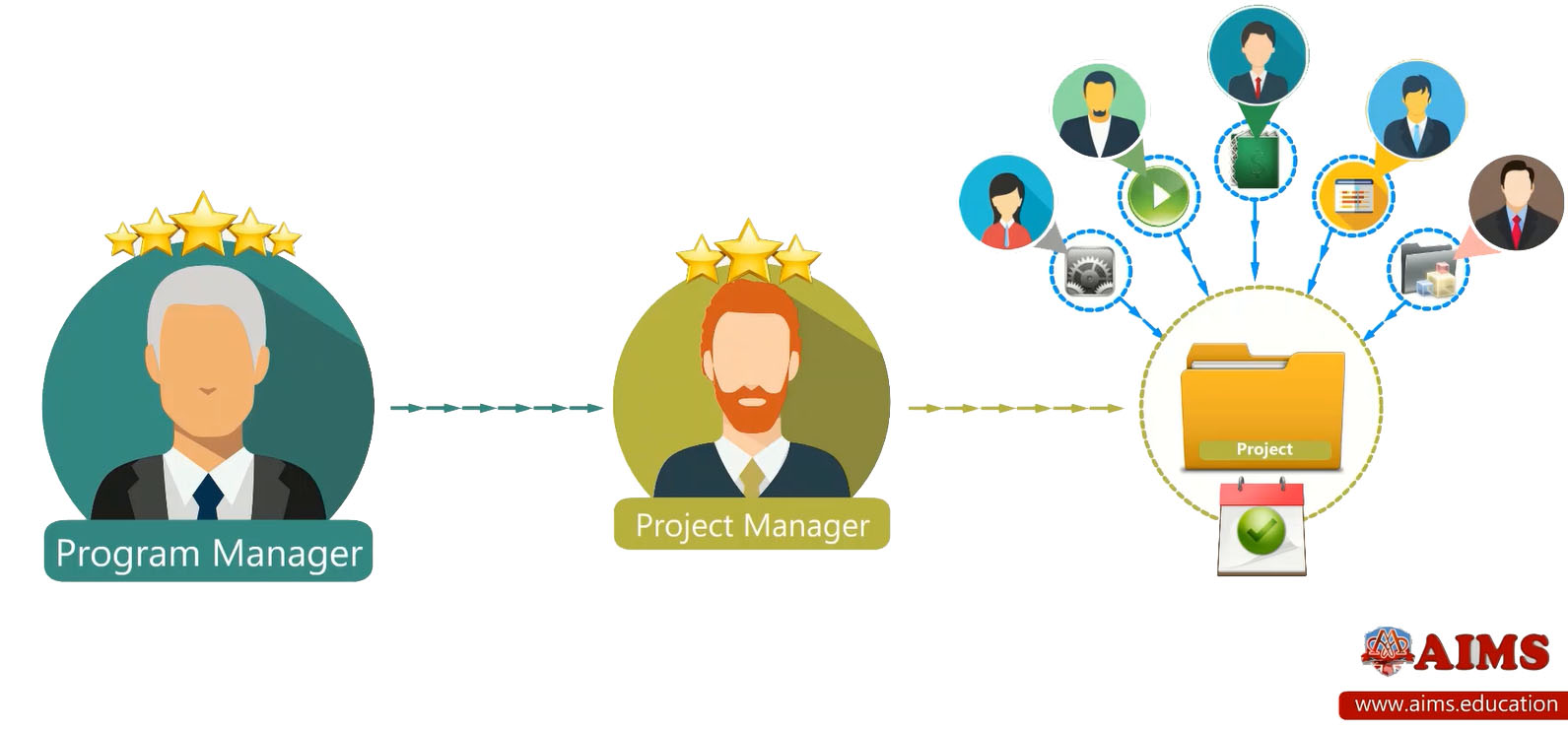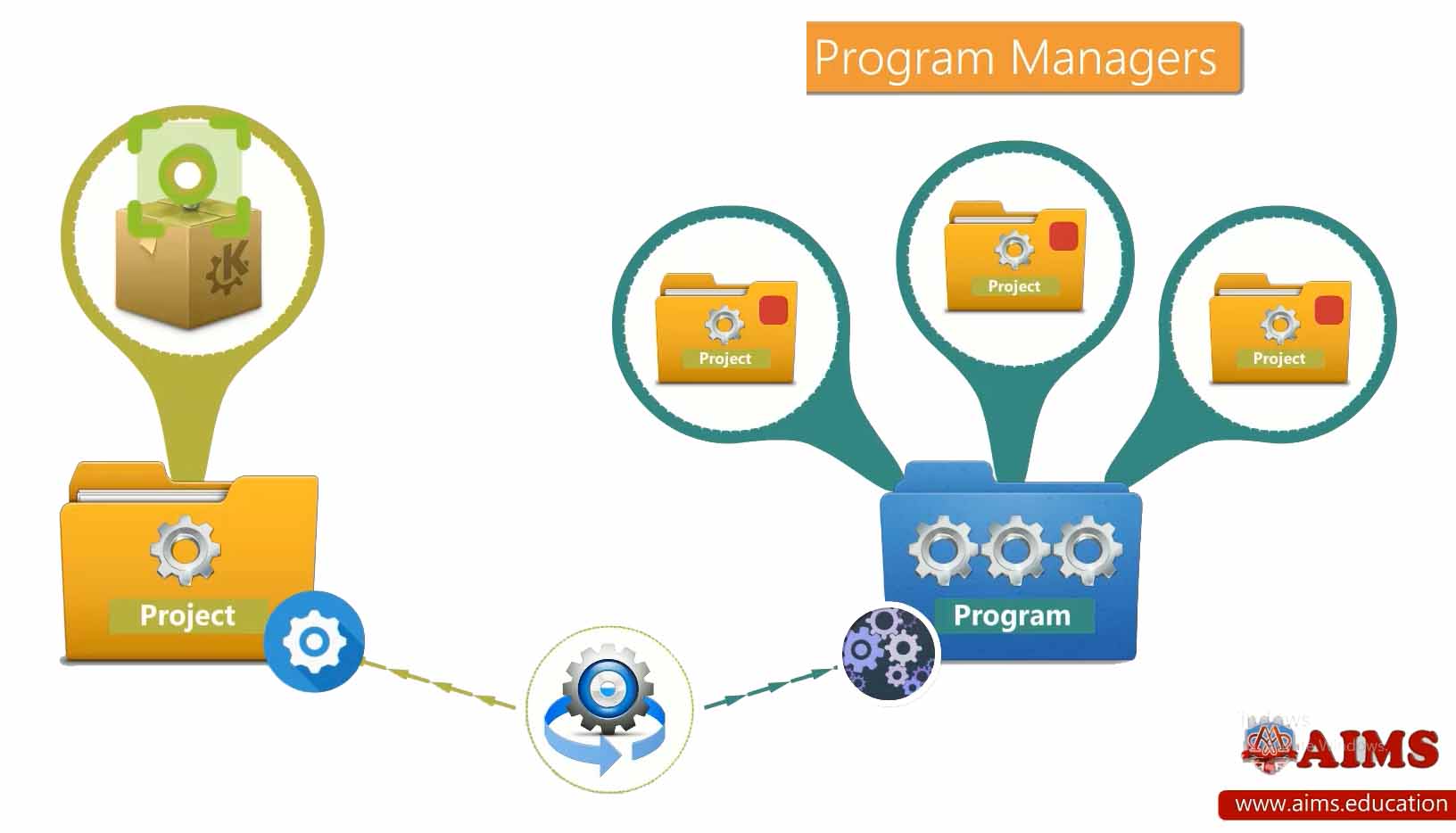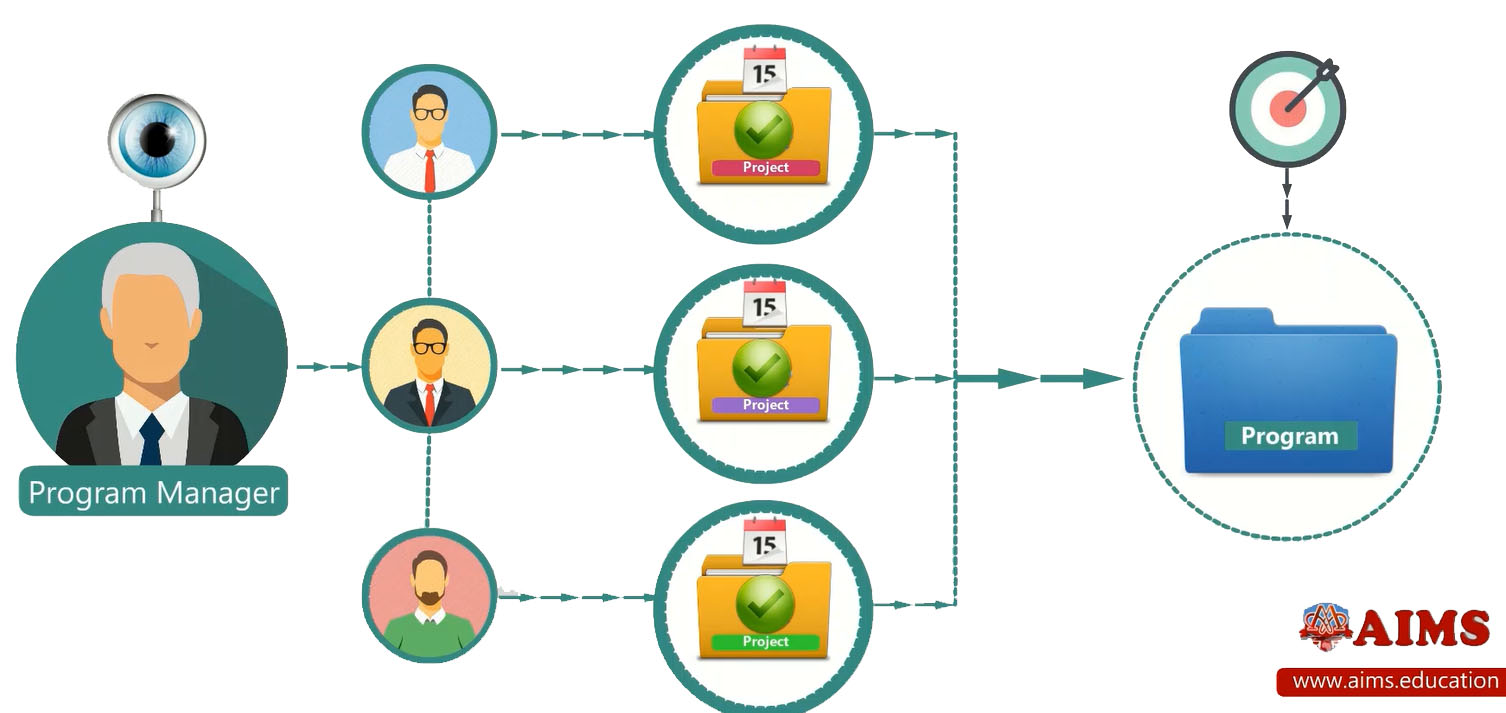Difference Between Project Manager and Program Manager
As the field of project management continues to evolve, new roles and positions have emerged to better handle complex and large-scale projects. Two such roles are that of a Program Manager and a Project Manager. Understanding the difference between a project manager and a program manager and the unique skills required for each is pivotal for the effective execution of strategic goals. The spectrum of responsibilities and scope varies significantly in project management vs program management. While project managers focus on the tactical aspects of individual projects, program managers oversee a portfolio of projects, driving strategic alignment, and orchestrating shared resources. Let us delve deep into the nuances of program manager vs project manager, illuminating the distinctiveness of each role.

Difference Between Project and Program
What is a Project?
A project is a temporary endeavor undertaken to deliver a unique product, service, or result. It has a defined beginning and end, specific goals, and defined outcomes. A project is managed by a Project Manager who ensures that each task is completed on time and within budget while meeting the project’s objectives.
EXAMPLE OF A PROJECT:
Let’s consider a telecommunications company that aims to develop a new mobile application. This endeavor constitutes a project. The project manager would be responsible for coordinating specific tasks, such as app design, coding, testing, and deployment. They would ensure the project follows a predetermined timeline, stays within the budget, and that the end product meets the quality standards set by the company.
What is Program?
A program is a collection of related projects managed in a coordinated manner to obtain benefits and control not available from managing the projects individually. The role of a Program Manager is more strategic, ensuring that the program delivers the overarching goals and objectives of the organization. They align and coordinate the projects within the program and oversee the interdependencies and potential risks across these projects.
EXAMPLE OF A PROGRAM:
Now, suppose the same telecommunications company decides to launch a comprehensive digital transformation initiative. This would entail not just the development of the mobile application (the project example above), but also other related projects like upgrading their website, implementing an advanced customer service system, and integrating their services with third-party platforms. This wide-ranging initiative would be a program. The program manager would oversee these individual, yet interconnected projects, ensuring they all align with the larger business objective of the digital transformation initiative. They would also facilitate the sharing of resources and streamline communication across these projects to achieve strategic benefits.

Project Manager VS Program Manager Roles
Let us delve into the project and program management roles in businesses, and discern the key difference between project manager and program manager.
| PROJECT MANAGER | PROGRAM MANAGER | |
| Scope and Objectives | Focuses on concluding the project within the designated timeline and budget. | Concentrates on realizing strategic business outcomes and objectives. |
| Time Frame | Operates within a set timeframe, with a clear start and finish. | Manages programs that may be continuous and could stretch across years. |
| Plan Execution | Develops and ensures successful execution of the project plan. | Develops and executes strategic plans aligned with organizational goals and oversees all projects within the program. |
| Budget Management | Allocates and manages resources within the project, controlling costs to maximize efficiency. | Manages the program budget and resource allocation across projects. |
| Strategic Communication | Is the central point for project-related communication, internally and externally. | Ensures strategic communication across various projects to enhance alignment and vision. |
| Team Size | Typically directs smaller, project-specific teams. | Oversees larger, possibly cross-functional teams, including multiple project managers. |
| Issues | Tackles and resolves issues within the confines of their project. | Handles risks and issues on a more holistic level, considering the entire program’s portfolio. |
| Stakeholder Management | Manages stakeholder engagement specific to their project. | Engages with a broader stakeholder group across all projects within the program. |
| Strategic Planning | Focuses on planning for the success of individual projects. | Entails aligning multiple projects under a unified strategic vision of the organization. |
| Resource Allocation | Allocates resources within the purview of their project alone. | Allocates resources across the program to ensure project interdependencies are aptly managed. |
| Risk Management | Addresses risks pertinent to their specific project. | Assesses and mitigates risks that could impact the entire program. |
| Inter-Project Coordination | Ensures effective coordination within project activities. | Promotes synergy and coordination among various projects, managing interdependencies and potential conflicts. |
| Stakeholder Communication | Communicates detailed project updates to stakeholders. | Communicates at a strategic level, focusing on the program’s progress and overarching direction. |
| Benefit Realization | Aims at achieving the project’s specific intended outcomes. | Guarantees that the program at large realizes benefits in alignment with organizational goals. |
| Quality Assurance | Ensures that project deliverables meet the set quality standards. | Monitors and upholds the quality across all projects, ensuring alignment with strategic objectives. |
| Change Management | Manages changes strictly within the project scope. | Oversees and orchestrates program-level changes that may have broad impacts across multiple projects. |

What is Program Management?
Program Management is a highly strategic process that involves managing several related projects concurrently to achieve a set of business objectives. It encompasses not just the execution of individual projects, but also the management of interdependencies, risks, and overarching benefits or outcomes. Program Management may further be elaborated on with the following examples.
Who is a Program Manager?
A Program Manager is a strategic professional in an organization who is responsible for overseeing multiple related projects (the program) to ensure they align with the organization’s objectives and strategic goals. Unlike a Project Manager who focuses on specific projects, a Program Manager manages the interdependencies and coordination between projects to achieve a bigger business purpose.
Program Management VS Project Management Examples
Let’s consider a couple of real-world examples to better illustrate the difference between a program manager and a project manager.
| PROGRAM MANAGER | PROJECT MANAGER |
| EXAMPLE 1: SOFTWARE DEVELOPMENT FIRM | |
| At a software development firm, the Program Manager would oversee a major initiative like the development of a new operating system. They would coordinate and manage multiple interrelated projects such as design, coding, testing, marketing, and distribution to ensure that all these projects align with the broader strategic objectives of the company. | On the other hand, the Project Manager in this context could be responsible for managing the coding project of the new operating system. They would oversee the team of developers, ensuring tasks are completed on time, resolving coding issues, and ensuring the quality of the code aligns with the project’s specific objectives and standards. |
| EXAMPLE 2: CONSTRUCTION COMPANY | |
| In a construction company, a Program Manager might be responsible for the development of a new residential complex. They would oversee projects such as land acquisition, building construction, marketing, and sales, coordinating all these projects to ensure they align with the company’s strategic goals. | Meanwhile, a Project Manager in this company could be in charge of the building construction project. They would manage the day-to-day operations, coordinate with different teams (architects, builders, suppliers), ensure the project meets regulatory requirements, and that it’s completed on time and within budget. |

Program Manager VS Project Manager Salary
When considering the roles of Program Manager vs Project Manager, one notable distinction arises in their respective salaries.
Program Manager Salary Outlook
- Senior Program Manager: A Senior Program Manager oversees multiple programs within an organization, ensuring they align with the company’s strategic objectives. Average Salary: $132,000 per year.
- Technical Program Manager: The technical project manager role involves managing technology-driven programs and coordinating with technical teams. Average Salary: $120,000 per year.
- Program Management Office (PMO) Manager: A PMO Manager oversees the program management office, which is responsible for standardizing project-related governance processes and facilitating the sharing of resources and methodologies among projects. Average Salary: $110,000 per year.
- Strategic Program Manager: A Strategic Program Manager aligns the program’s goals with the organization’s strategic objectives. They also communicate these objectives to the project teams. Average Salary: $108,000 per year.
Project Managers Salary Outlook
- Construction Project Manager: This role involves overseeing construction projects from conception to completion. Average Salary: $95,000 per year.
- IT Project Manager: An IT Project Manager is responsible for planning, executing, and finalizing projects according to strict deadlines and within budget. This includes acquiring resources and coordinating the efforts of team members and third-party contractors or consultants to deliver projects according to plan. Average Salary: $88,000 per year.
- Marketing Project Manager: A Marketing Project Manager oversees marketing projects, ensuring they meet their objectives and are completed on time and within budget. Average Salary: $81,000 per year.
- Healthcare Project Manager: Healthcare Project Managers oversee projects within healthcare organizations. They ensure compliance with healthcare regulations and standards. Average Salary: $98,000 per year.
Certifications for Programme Management
AIMS offers several globally recognized certifications for professionals looking to enhance their program management expertise, at all levels. Selecting the right certification hinges on your career aspirations, the extent of your experience, and the particular demands of your organization or sector, especially when distinguishing between roles like program manager VS project manager.
- Certified Project Manager validates your knowledge, experience, and skills in project management. It demonstrates your ability to manage and lead projects effectively.
- Online Project Management Courses (CPME) encompass key project management principles and provide a strong foundation in project management practices using both agile and waterfall methodologies.
- A diploma in Program Management offers an in-depth understanding of program management principles, techniques, and tools. It equips you with the skills necessary to manage complex programs that align with business strategy.
- MBA in Project Management online degree provides a broad perspective on business management along with a specialized understanding of project management practices. It is designed for those who aspire to leadership roles in project management.
- PhD in Program Management online is a rigorous research-focused online degree. It prepares you for a career in academia or high-level consulting, contributing to the development and refinement of project management theories and practices.

How to Become a Successful Program Manager?
Becoming a Program Manager involves several steps, and each of these steps contributes to developing the required skill set for the role successful project manager:
1. Earn a Master’s Degree
While a master’s degree is not required for all Program Manager positions, some organizations prefer candidates with advanced education. A Master of Business Administration (MBA) or a master’s degree in project management can provide more in-depth knowledge and skills.
2. Gain Work Experience
After earning a bachelor’s degree, aspiring Program Managers should seek opportunities to gain experience in project management or a related field. This role could entail overseeing minor initiatives or providing support to seasoned Project Managers in more extensive endeavors, often setting the stage for a comparative analysis of Program Manager VS Project Manager scenarios.
3. Obtain Certification
Earning a certification in project management can demonstrate a commitment to the profession and a certain level of expertise. AIMS offers Program Management training, which is recognized globally.
4. Develop Leadership Skills
Program Managers need strong leadership skills to manage diverse teams and drive projects toward successful completion. This can be developed through leadership training programs or on-the-job experience.
5. Stay Updated
The field of program management is always evolving, so it’s essential to stay updated with the latest industry trends and best practices. This can be achieved through professional development courses, networking events, and industry publications.
Conclusion
In conclusion, the role of a Program Manager is multifaceted, requiring a combination of technical knowledge, leadership skills, and continuous learning. The path to becoming a Program Manager often involves a blend of academic training, practical work experience, and professional certification. However, the principal difference between a Project Manager and a Program Manager lies in the scale and scope of their responsibilities. While both roles are crucial in an organization, a Project Manager oversees individual projects, whereas a Program Manager coordinates a series of related projects, or a ‘program,’ to deliver benefits and achieve strategic objectives. As such, understanding program management vs project management is essential for organizations to efficiently allocate resources and accomplish their goals.
